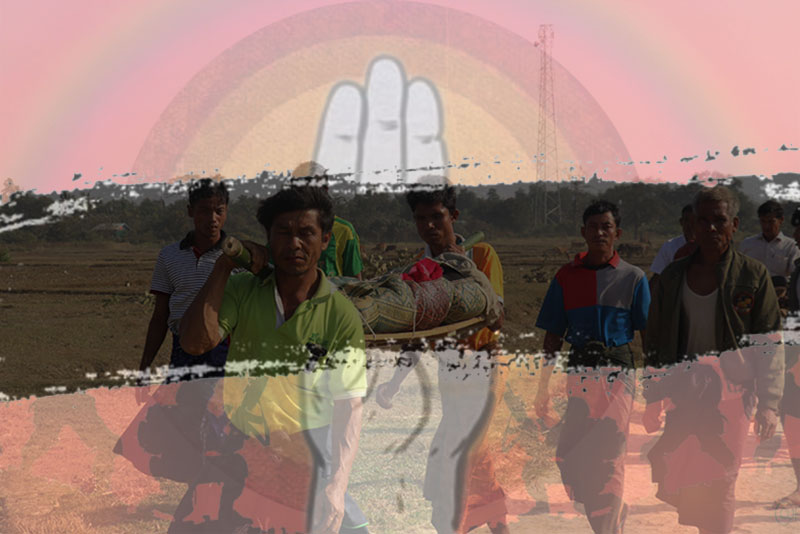- Seven civilians, including infant, killed in junta airstrikes on Kyauktaw and Mrauk-U
- The Mizoram Hard Journey (or) Sailing Up the Kaladan
- Arakan Army expands operations into Sagaing Region, seizes four junta camps
- ULA purchases paddy from farmers amid market shortage in Arakan State
- After Arakan fighting, Taungup residents struggle to rebuild homes
Our Scars Are All Similar
Blood-stained slippers abandoned in the streets; armed security forces shouting orders at the citizens they are sworn to protect; and seemingly every day the sound of gunfire, explosions or both. This is the new reality in Yangon, Myanmar’s largest city. Six months ago, few would have predicted such scenes of bloodshed and chaos in the commercial capital.
25 May 2021

By Rammar Kyaw Saw
Blood-stained slippers abandoned in the streets; armed security forces shouting orders at the citizens they are sworn to protect; and seemingly every day the sound of gunfire, explosions or both. This is the new reality in Yangon, Myanmar’s largest city. Six months ago, few would have predicted such scenes of bloodshed and chaos in the commercial capital.
Roads blocked by barbed wire barricades and the deployment of security forces at street corners were also seen in the towns of Arakan State two years ago.
These days — more specifically, since early February — such scenes are commonplace in cities and towns throughout Myanmar. People from nearly every township where there has been mass protest have heard the sound of gunfire. Since the military seized power on February 1, movements against the regime have developed in towns throughout Myanmar.
As the military and police have cracked down on the protests, at least 1,000 people have been killed so far. It is traumatic news for all humans when a person, regardless of faith or race, is killed unjustly. Humanitarianism does not discriminate on the basis of skin colour or language.
We felt sad when we saw death on the roads of Yemen during the Arab Spring. We feel angry and sad when an African-American man is shot dead by police in the United States of America.
We must honour those killed as a result of oppression by those who have power and weapons. We must respect and appreciate them. It is our right to freedom of expression.
In fact, most ethnic national races have wanted successive governments to implement the promise of the Panglong Agreement, which was made before the country’s independence in 1948. Any government, from the Anti-Fascist People’s Freedom League government to the current military council, could have implemented the promise; there is no reason to shed the blood of the people anymore.
Due to the regime’s brutal crackdowns in downtown Yangon (where local and foreign media are present), people will now understand why ethnic national races have engaged in armed struggle for decades. The world will better know how villagers from remote areas without any media have suffered.
The February coup is not unlike General Ne Win’s putsch so many years ago. Who can guarantee that the current military rulers will not stage a coup again after the promised new elections, if the political party they like does not win? They do not have a new strategy. They will do the same as in 1962.
During the civil war that came along with independence, communists were killed. The blood of ethnic national races and Bamar people was shed. To end that situation, a negotiated solution should be sought at a round table.
There are other distressing situations now unfolding in the cities and towns that rural, ethnic populations know well: Villagers from armed conflict areas have long been arrested on suspicion, with their bodies returned to their families the next day. Some families do not even get back the body of their missing family member. Such occurrences are seen now in Yangon, Mandalay and other cities and towns across Myanmar.
Dictators are always considering how to strengthen their power. They do not care how many people are killed along the way. Thus, a military dictator can be toppled by a united force. It cannot be overthrown by each group fighting separately.
We need to reconsider how the people suffered under successive military juntas. Farmers had to sell their paddy to military forces for a price lower than 20% of the market price. And they are forced to sell a certain amount of paddy per acre. Even students were forced labour in building roads and dams. These are the situations people have faced under the respective juntas.
The military coup affects all people throughout Myanmar. If you do not do anything because you are not affected, then you will suffer later. We could not enjoy the freedom under the government that was said to be practicing democracy. Now, the situation is getting worse. We cannot travel anytime now. We cannot find justice from those who seized power. We can live peacefully only when the people’s power is returned to the people.
We were born under one-party dictatorship. We were taught fake history under the SLORC and State Peace and Development Council. We were brainwashed with fabricated information and words of incitement that hid the truth. For example, ethnic armed groups are described as heinous rebels and they, the military, are described as heroes protecting the country from all manner of danger.
Currently, anti-military protests are seen in many towns in non-ethnic areas. The revolution is strong in some areas of ethnic people. We want you all to understand those who have yet to participate in the revolution. We, ethnic people, can understand the current situation because we have already experienced the situation firsthand.
Our indignation and resentment as well as trauma and injury have not been healed, and scars remain. Thus, we need to march towards our goal unitedly, without finding fault with each other, because we all are people with similar scars.






.jpg)













